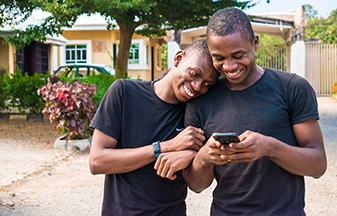Boy Somjai and Jam Chainukul (not their real names) are a young same-sex couple from Bangkok, Thailand. At the start of their relationship, they decided to take HIV tests for the first time. Looking for information online, their friends suggested the Rainbow Sky Association of Thailand (RSAT), a community-based HIV clinic located off a busy street in Bangkok.
RSAT, with four clinics and 10 drop-in centres in different cities across Thailand, serves as a one-stop service where gay men and other men who have sex with men and transgender people can access HIV prevention services and take part in HIV-related information sessions, with flexible service hours suitable for the lifestyles of many people from key populations.
Danai Linjongrat, the Executive Director of RSAT, said, “Access to HIV services for key populations is among the biggest challenges to the HIV response in the country. It is extremely important that key populations can access HIV prevention and treatment services without fear of discrimination.”
Mr Boy and Mr Jam, who now return to RSAT every three months for regular check-ups, said, “When we first visited the clinic, we were really nervous, as we were looking for a place that respects our confidentiality. Here we found more than an HIV clinic—we found a place we can trust, like a family. The health staff made us feel comfortable to share our story; they did not judge us and they understood our needs with an open mind.”
The success of RSAT is credited in part to its health workers being members of the populations they serve. RSAT has adopted the country’s key population-led health services model, in which people from key populations identify and meet the HIV and other health-related needs of their peers. “We understand the needs of our clients, what they want, where they live and how they feel, because our staff members are people from the communities,” says Mr Linjongrat.
Community health workers provide needs-based and client-centred services, including pre-exposure prophylaxis (PrEP), legal consultations, harm reduction, screening for sexually transmitted infections, counselling and hormone level check-ups for transgender people. Depending on the outcome of a person’s HIV test, they are offered a referral for antiretroviral therapy or an in-depth discussion about taking PrEP, all in a non-judgemental and supportive atmosphere.
RSAT is one of seven community-based organizations in Thailand that provide PrEP services free of charge through lay providers under the Princess PrEP Project. Currently, 1200 people are accessing PrEP through RSAT clinics and drop-in centres. The Thai Red Cross AIDS Research Centre, with the support of the United States President’s Emergency Plan for AIDS Relief through the LINKAGES Thailand project, implements continuous capacity-building to ensure that community health workers can provide HIV services in accordance with national standards.
RSAT uses different ways to generate demand for and promote its programmes and to carry out outreach work. Phubet Panpet, Deputy Director at RSAT, said, “Depending on our target audience, we go to different places, such as saunas, entertainment complexes, schools and universities, to raise awareness about HIV prevention and encourage people to get tested for HIV.”
Kunpawee Isalam, a staff member of the outreach team in Bangkok, is a transgender person who understands the stigma and discrimination faced by the transgender community. “We plan outreach activities that we know transgender people will be interested in, with the aim of increasing their self-confidence. For many, it is so hard to feel they can get support, and they fear discrimination. RSAT provides a safe space and HIV prevention options,” she said.
RSAT uses social networking sites to reach out to young gay men and other men who have sex with men. Staff members register as users and create profiles on dating applications to share HIV-related information. “At the beginning of the conversation, the outreach worker explains about the clinic and engages people in a conversation related to HIV prevention,” said Mongkol Jaidee, a field officer. “I choose the location, see who is connected, and send them personal messages to introduce the services provided by the clinic. I normally receive positive feedback, and it is common for people to come back later with questions and visit us in the following days.”
Mr Linjongrat concluded, “We differ from other services by caring for people by looking into what they need and what we can do to help them. Community-led services are a proven strategy and an essential feature of the HIV response in Thailand.”



